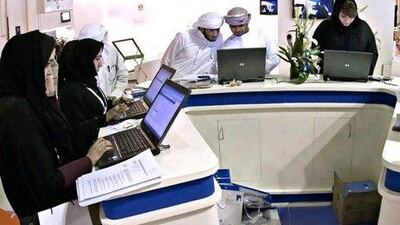DUBAI // Thousands of Emiratis are shunning paid employment in favour of staying at home and receiving social allowances, officials revealed yesterday.
There are about 14,000 Emirati women who receive the allowances but are considered by the Ministry of Social Affairs as fit for work.
Of these, 85 per cent are not willing to find employment despite the available opportunities for work or training, the ministry said.
"There are some who receive social allowances, who their age and qualification allows them to work, but are choosing not to," said Mona Al Za'abi, chief executive of the department of corporate and support services at the ministry.
"This category is sitting at home despite the large number of jobs provided, whether in the public or private sector," she added. "They are comfortable with their situations and have become too dependent."
Social allowance is a monthly payment of Dh5,200 given by the ministry to Emiratis who cannot afford to provide for themselves, or to the children or wives of Emirati men whose salaries cannot support their whole families.
Experts said the problem was now ingrained in the country and would not be fixed overnight.
"Unfortunately, the problem of what we call 'inactive' jobseekers is not new and has been here for years," said Eisa Al Mulla, executive director of the Emirates Nationals Development programme, one of the bodies concerned with integrating Emiratis into the private sector at a federal level.
"The problem has accumulated over years of unintentional miss-practices by the concerned bodies," Mr Al Mulla said. "There was not enough firmness in dealing with this category or pushing it into the labour market."
According to Ms Al Za'abi, certain jobs are simply not popular enough to encourage people into the workplace. The most disliked jobs were "practical" posts, such as a cashier in a supermarket or petrol station, or any other work that included physical activity.
In the last two years, Ms Al Za'abi was only able to fill a little more than 10 per cent of the 1,000 positions that became open.
"Some only want desk or secretarial jobs and refuse to accept any other vacancy regardless of their qualifications," she explained.
Of the 14,000 collecting the social allowance, only about 30 per cent have qualifications beyond secondary school certificates.
According to Ms Al Za'abi, women from the Northern Emirates have the most demands and are the most difficult to employ.
Common reasons for not accepting work include a lack of transport, long shifts and disapproving parents or husbands.
One case in particular that attracted the attention of the ministry involved two sisters who each had a BA in business administration but whose father would not allow them to work.
"He [the father] got upset with us and asked not call again," Ms Al Za'abi said. "In such cases we are helpless and cannot to do anything to change their minds."
But Mr Al Mulla believes not enough is being done to accommodate valid concerns, such as an unwillingness to travel long distances.
"If we could create jobs that are convenient for those jobseekers, are socially acceptable and near them, such as call centres in the Northern Emirates, through providing facilities for private companies, these could encourage them," he said.
The problem is not confined to women, however. Mr Al Mulla told of a person who receives the allowance, who asked him why he should work in the private sector with a difficult job when others had much easier roles with more money.
"What we need to do is to make the rewards of working much higher than the rewards of staying at home," Mr Al Mulla said. "It is when we will succeed."
A 27-year-old Emirati who lives in Al Khadra, near the border with Oman, said he did not mind his 22-year-old wife working, but said he would not allow her to work too far away from their home.
His wife, a teacher, was only able to find a job in Abu Dhabi but was not prepared to leave their two children for so much of the week.
"There are not many jobs in Al Khadra and it is too far to commute every day. I cannot agree that she would leave the children for the whole week for a job," he said.

